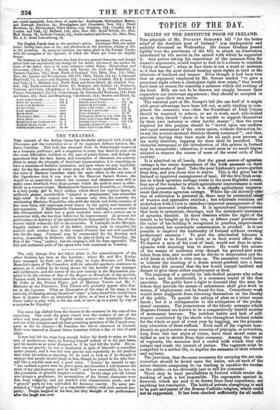The scene has shifted from the theatre to the cemetery
in the case of two comedians. This week the grave closed over the remains of one of the oldest and most popular of English comic actors—the inimitable Liston; and one of the youngest and not least promising members of the French com- pany at the St. James's—M. Narcisse, the clever successor of Lienard. Both were interred at Kensal Green cemetery within a day or two of each other.
Liston had left the stage long enough before his death to enjoy an Irish sort of posthumous fame, by hearing himself talked of in the past tense, and his merits as an actor discussed, as if he had left the world. His ta- lent was sue generis: he was a humourist in spite of himself—a comedian under protest; and it was this very gravity and superiority to his position that made his acting so amusing; for he used to look as if he thought it strange that people should laugh at him, though he joined in the joke him- self like a sensible man and a good actor. " Nature," he seemed to say, " has unfitted a grave man for grave parts, and therefore I will humour the trick of my physiognomy and be droll": and how successfully he was so, the generation of grateful laughers testified. On the stage and off, Liston was always a gentleman: his assumptions of the lowest characters were free from vulgarity, and yet marked with characteristic truth; and in " genteel" parts he was unrivalled for decorous suavity. No actor per- sonated a fool of quality," or a respectable oddity, with such natural pro- ' priety. People laughed at his face, but they thought of his performance after the laugh was over.


























 Previous page
Previous page